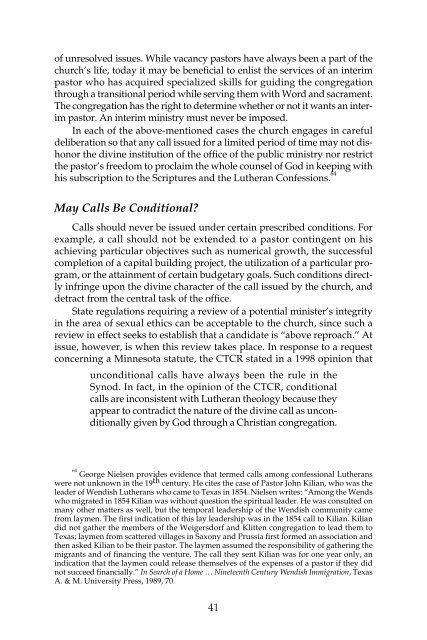45930 Divine Call CTCR final - The Lutheran Church—Missouri Synod
45930 Divine Call CTCR final - The Lutheran Church—Missouri Synod
45930 Divine Call CTCR final - The Lutheran Church—Missouri Synod
Create successful ePaper yourself
Turn your PDF publications into a flip-book with our unique Google optimized e-Paper software.
of unresolved issues. While vacancy pastors have always been a part of the<br />
church’s life, today it may be beneficial to enlist the services of an interim<br />
pastor who has acquired specialized skills for guiding the congregation<br />
through a transitional period while serving them with Word and sacrament.<br />
<strong>The</strong> congregation has the right to determine whether or not it wants an interim<br />
pastor. An interim ministry must never be imposed.<br />
In each of the above-mentioned cases the church engages in careful<br />
deliberation so that any call issued for a limited period of time may not dishonor<br />
the divine institution of the office of the public ministry nor restrict<br />
the pastor’s freedom to proclaim the whole counsel of God in keeping with<br />
his subscription to the Scriptures and the <strong>Lutheran</strong> Confessions. 64<br />
May <strong>Call</strong>s Be Conditional?<br />
<strong>Call</strong>s should never be issued under certain prescribed conditions. For<br />
example, a call should not be extended to a pastor contingent on his<br />
achieving particular objectives such as numerical growth, the successful<br />
completion of a capital building project, the utilization of a particular program,<br />
or the attainment of certain budgetary goals. Such conditions directly<br />
infringe upon the divine character of the call issued by the church, and<br />
detract from the central task of the office.<br />
State regulations requiring a review of a potential minister’s integrity<br />
in the area of sexual ethics can be acceptable to the church, since such a<br />
review in effect seeks to establish that a candidate is “above reproach.” At<br />
issue, however, is when this review takes place. In response to a request<br />
concerning a Minnesota statute, the <strong>CTCR</strong> stated in a 1998 opinion that<br />
unconditional calls have always been the rule in the<br />
<strong>Synod</strong>. In fact, in the opinion of the <strong>CTCR</strong>, conditional<br />
calls are inconsistent with <strong>Lutheran</strong> theology because they<br />
appear to contradict the nature of the divine call as unconditionally<br />
given by God through a Christian congregation.<br />
64<br />
George Nielsen provides evidence that termed calls among confessional <strong>Lutheran</strong>s<br />
were not unknown in the 19 th century. He cites the case of Pastor John Kilian, who was the<br />
leader of Wendish <strong>Lutheran</strong>s who came to Texas in 1854. Nielsen writes: “Among the Wends<br />
who migrated in 1854 Kilian was without question the spiritual leader. He was consulted on<br />
many other matters as well, but the temporal leadership of the Wendish community came<br />
from laymen. <strong>The</strong> first indication of this lay leadership was in the 1854 call to Kilian. Kilian<br />
did not gather the members of the Weigersdorf and Klitten congregation to lead them to<br />
Texas; laymen from scattered villages in Saxony and Prussia first formed an association and<br />
then asked Kilian to be their pastor. <strong>The</strong> laymen assumed the responsibility of gathering the<br />
migrants and of financing the venture. <strong>The</strong> call they sent Kilian was for one year only, an<br />
indication that the laymen could release themselves of the expenses of a pastor if they did<br />
not succeed financially.” In Search of a Home … Nineteenth Century Wendish Immigration, Texas<br />
A. & M. University Press, 1989, 70.<br />
41


